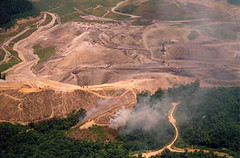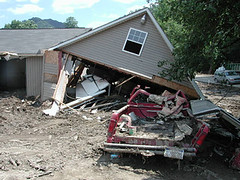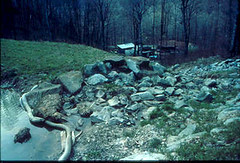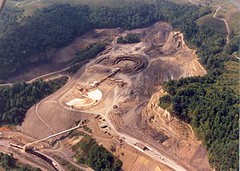 Writing in the April 2005 Harper's, Erik Reece examined the effects of an increasingly popular coal mining procedure in "Death of a Mountain", laying out a nightmare scenario worthy of Tolkien. He spent a year returning again and again to Lost Mountain, a peak in the Appalachians of eastern Kentucky, to observe its gradual destruction by way of moutaintop removal. The magician working this black magic, a coal company called Leslie Resources, had received a permit to start in the fall of 2003. At that time, before operations began, he wandered the area and did a poetic inventory of its beauties. A year later it was nearly unrecognizable:
Writing in the April 2005 Harper's, Erik Reece examined the effects of an increasingly popular coal mining procedure in "Death of a Mountain", laying out a nightmare scenario worthy of Tolkien. He spent a year returning again and again to Lost Mountain, a peak in the Appalachians of eastern Kentucky, to observe its gradual destruction by way of moutaintop removal. The magician working this black magic, a coal company called Leslie Resources, had received a permit to start in the fall of 2003. At that time, before operations began, he wandered the area and did a poetic inventory of its beauties. A year later it was nearly unrecognizable:"The wasted summit is now a series of tall gray mounds of rock piled to my right. to my left, the entire eastern ridgeline has been carved up and hollowed out; now it is only one wide black crater. And down in front of me, a gray bench has been turned to concrete by the heavy trucks that, over and over, have backed to its edge, then methodically dumped this mountaintop down its side. I'm standing in the middle of a wasteland, a dead zone."In the interim he catalogued a list of horrors, including the systematic ruination of an ecosystem, and the intimidation of single mothers and communities who dared to speak out against the destruction and poisoning of their homes and the corporate murders of their friends and families.
 This is what Roberts has stood behind, defended, and enabled:
This is what Roberts has stood behind, defended, and enabled:"In April 2000, Washington DC lawyer John Roberts filed an amicus brief on behalf of the National Mining Association in the federal 4th Circuit Court to block a lawsuit filed by West Virginia citizens opposed to the coal industry's destructive "mountaintop removal" practice. Two years later, Roberts was nominated by President Bush and confirmed to the powerful DC Circuit Court of Appeals. In April 2004, as a judge on that court, Roberts ruled against environmentalists who were pushing for more restrictive government regulations over copper smelters--many of whose owners are members of the National Mining Association--that emit toxic lead and arsenic pollutants."
 The destruction has been going on for awhile now. Even media outlets in the big cities have been known to take notice. Effects on communities and human beings were outlined in the Washington Post last summer.
The destruction has been going on for awhile now. Even media outlets in the big cities have been known to take notice. Effects on communities and human beings were outlined in the Washington Post last summer. Brave and tireless women like Dianne McFarland, Julia Bonds, and Teri Blanton have fought for years to make mining companies accountable and force the government to enforce what little regulation there is, and Blanton is currently involved with a suit to stop the EPA from issuing further permits to mining companies engaged in this most horrible of land rapes.
 Roberts may seem like a relatively innocuous choice to some, compared to a legal imbecile like Thomas or a rabid dog like Scalia. But he looks after his masters, and his appointment promises to be just one more piece of the corruption endemic in the White House record on mining issues, and the Bush-directed shift away from regulating industries and toward giving a free hand to corporations to do as they please. And as usual in our "classless" society, only the poor will be forced to bear the worst of the burden.
Roberts may seem like a relatively innocuous choice to some, compared to a legal imbecile like Thomas or a rabid dog like Scalia. But he looks after his masters, and his appointment promises to be just one more piece of the corruption endemic in the White House record on mining issues, and the Bush-directed shift away from regulating industries and toward giving a free hand to corporations to do as they please. And as usual in our "classless" society, only the poor will be forced to bear the worst of the burden.Pictures courtesy of Appalachian Voices





No comments:
Post a Comment